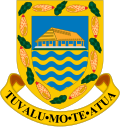 |
|---|
Visitors to Tuvalu must obtain a visa on arrival unless they are citizens of one of the visa-exempt countries. All visitors must have a passport valid for at least 6 months. [1]
 |
|---|
Visitors to Tuvalu must obtain a visa on arrival unless they are citizens of one of the visa-exempt countries. All visitors must have a passport valid for at least 6 months. [1]

Citizens of the following countries and territories may enter Tuvalu for stays up to the duration listed below:
90 days 90 days within any 180 days
|
| Date of visa changes |
|---|
|
Tuvalu signed a visa exemption agreement with Saint Kitts and Nevis on March 4th, 2022 but has yet to be ratified. [4]
Serbia and Tuvalu signed a mutual visa exemption agreement on November 21st, 2024 and it's yet to be ratified. [5]
Citizens of other countries must obtain a visa on arrival for a maximum stay of 1 month. They must pay a visa fee (100 AUD). [6]
Visitors from the following countries and territories are not required to pay a visa fee (100 AUD). They get a visa on arrival for a maximum stay of 1 month: [7]